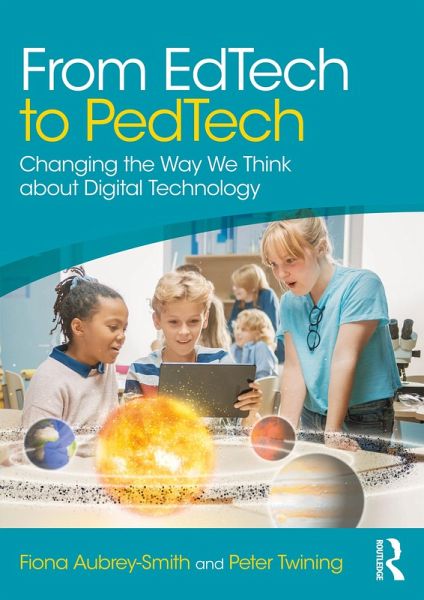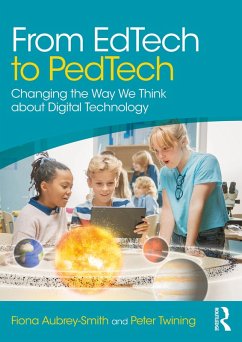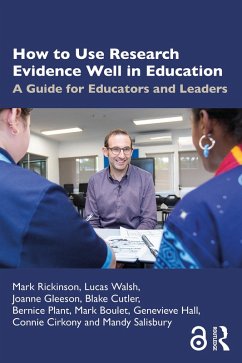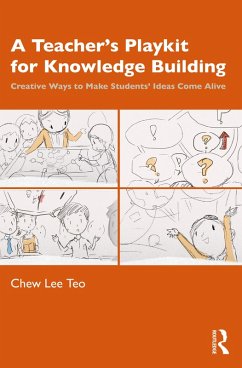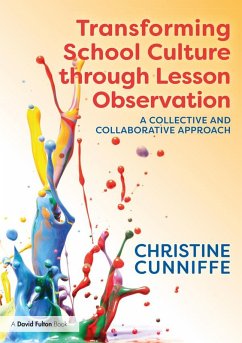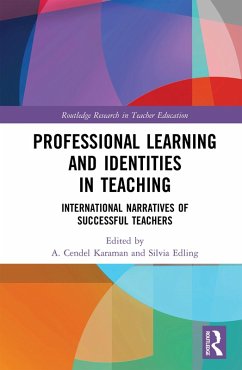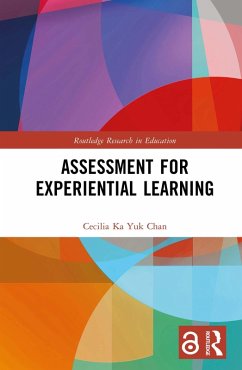for digital innovation become crystal clear. A must-have resource for anyone aiming to become a champion of technology that can transform learning."
Professor Dame Alison Peacock, Chief Executive, Chartered College of Teaching
"As an educator, one of the most powerful things you can do is to align our pedagogical beliefs and practices with the effective use of technology in the classroom. And that's exactly what Fiona and Peter 's book provides - a roadmap for teachers to invest in their own professional capital and improve the life chances of children in their care. A must-read for those committed to driving change and taking their own practice to the next level."
Karine George, Chief Education Officer, Educate, and former Headteacher
"Like it or not, and still many teachers don't much like it, the future of teaching is going to be far more technology driven. Read this book, and it will ensure that the technology will be used in the interests of students and genuine imaginative learning"
Sir Anthony Seldon, Emeritus Professor and former Vice Chancellor of the University of Buckingham
"We have been waiting for something like this that bridges the gap between pedagogy and technology. For too long they have been seen by many as mutually exclusive. This book will greatly support every teacher's learning - a must for every school"
Claire Lowe, CEO, The Inspire Learning Partnership and member of the Department for Education Headteacher Advisory Board
"The 50 year EdTech revolution has consistently over-promised and under-delivered. Here, Fiona and Peter explore the missing links, and in PedTech they build the foundation all educators should reference before they invest if they want significant return"
Stephen Cox, Founder, World Education Summit, Chief Executive, Osiris Educational
"For decades, books have implored teachers to use EdTech with not a lot of success. Covid fixed that problem. Now to capitalise on this usage, and not watch the slip back into the old grammar of schooling, Aubrey-Smith and Twining highlight the "why" - the importance of understanding teacher beliefs. This book introduces the Funnel of Influences and the pivotal role of pedagogical alignment - a powerful notion. It's well worth reading this book to better and deeper understand these concepts".
"Who's driving the EdTech bus? After reading this book, you will become the driver."
Professor John Hattie, Emeritus Professor, Melbourne Graduate School of Education and Chair of the Board of the Australian Institute for Teaching and School Leadership
"In the earliest days of EdTech the steady stream of remarkable new technologies suggested a future full of excitingly effective new directions for learners and learning: multimedia, high capacity storage, digital video, natural language programming, portable and pocketable devices, the world wide web code, trouble free communications, rich data, and so much more. Disappointingly the heroic teachers and children who danced with delight at these myriad opportunities were let down by the rather dull policies and pedagogies that resulted. Why?
But then along comes this excellent, timely, book which tackles the "why?!" but also nourishes the souls of those heroic pioneers by re-arming them with pragmatism, awareness, clarity and esteem. Hurrah to all that."
Professor Stephen Heppell, Felipe Segovia Chair in Learning Innovation at Universidad Camilo José Cela, Madrid
"It's lovely to read a book that states boldly at the outset that human beings are at the heart of education. A book that uses the word pedagogy and explains what it means. This is a great read full of practical advice and useful information for any teacher, parent or learner who wants to get the best from EdTech."
Professor Rose Luckin, Founder and Director of Educate and Professor of Learner Centred Design, UCL Knowledge Lab
"From EdTech to PedTech has arrived at exactly the right time. The pandemic driven rush to embrace digital technologies has by now given way to more evenly paced considerations. Should schools return to pre-pandemic approaches to technology or reset and accept that technology has irreversibly changed our lives? As Aubrey-Smith and Twining rightly point out, the pandemic may have brought these discussions to life but the dilemma upon which they are premised has been around since the first computer entered the first school.
Schools are so caught up with the need to perform according to whatever policy matrix they are being judged by at any given time, they do not always get the time to consider the beliefs, philosophies, ideas or desirable outcomes that sit. They might not even see it as necessary.
In leading us away from EdTech towards PedTech, the central premise of the book, Aubrey-Smith and Twining offer more than return or reset. They inspire renew. With a careful and detailed explication of why alignment between pedagogical beliefs, intentions and practice matters, the authors offer a series of activities designed to change pedagogic practice to the benefit of our pupils.
It is a great book. Nicely written, accessible without over simplification, and practical. Designed to get teachers thinking."
Dr Carol Azumah Dennis, Deputy Associate Dean, The Open University
"This book encourages teachers to consider how they use technology and how this aligns with their pedagogical beliefs. This deep-level focus on the 'why', rather than just the 'what', of edtech, is exactly what we need in education to ensure that where technology is used, it really adds value to pupil's learning. I congratulate Fiona Aubrey-Smith and Peter Twining on this very important book."
Emma Goto, Senior Lecturer in Primary Education, University of Winchester
"A thought-provoking perspective on how to better integrate technology in education to achieve meaningful learning outcomes! Delving into the complexities of the current discourse on EdTech, this book argues for a change to the way we think about digital technology in pedagogically-led practice, moving from the ideology of EdTech to PedTech. This is a must-read for educators and educational leaders who want to stay ahead of the curve in the ever-evolving world of technology and education."
Dr Neelam Parmar, Director of Digital Learning, Asia International School and Chief Digital Officer for E-ACT
"For a long while now, we have been told that technology will change the way we learn. This book points out that, until we adapt pedagogy to embrace the potential of technology, the promise will remain unfulfilled. More than that, the book explains how pedagogy can unleash the potential we have anticipated for so long. Read it and act!"
Professor Mick Waters, Wolverhampton University, and former Director of Curriculum for the Qualifications and Curriculum Authority
"It is beyond refutation that investments in digital technology for schools have yet to live up to the hyperbole. As Fiona and Peter eloquently assert, focusing on aligning foundational pedagogies with the use of digital tools provides a much-need balance to the spectre of technological determinism which currently dominates the global narrative."
Dr Sonny Magana, Chief Educational Optimist, Magana Education
"I couldn't stop reading it! It is so good to see a practical application from cover to cover. Dr. Aubrey-Smith and Prof. Twining present a step-by-step framework for self-reflection on our pedagogical practices, intentions, and beliefs. This framework allows teachers to focus on their expertise while using technology to augment learning possibilities. I loved the personas with different teaching and learning styles, as it connects theory to practice for better clarity to the reader. In a world where artificial intelligence is gaining terrain, this book is timely to guide education systems in their journey to answer the demands of the fourth industrial revolution. I truly enjoyed reading it!
Erika Twani, Co-Founder and CEO, Learning One-to-One Foundation
"This book manages something that is unusual in the world of education; it appeals to those who are great advocates of technology and all that it offers, as well as those who are a little more sceptical. It does this by offering a laser-sharp focus on the effective pedagogy that must underpin the successful use of any technology. As a long-time advocate for the need to ensure technology use in schools is not simply a case of leaping on the next shiny device, it is a breath of fresh air. Its format, too, makes it something special; it moves seamlessly from a detailed and intelligent consideration of what research says around education technology to reflective activities, examples and case studies that give real opportunity to support and change practice."
Cat Scutt MBE, Director of Education and Research, Chartered College of Teaching.
"This book is about EdTech in practice and explores the relationship between pedagogical beliefs, intentions, and practices. It sets out six key messages about EdTech and clarifies research terminology and approaches. The book takes the reader on a journey through four different pedagogical belief systems, introduces the Funnel of Influences model, and provides key terminology to support thinking more precisely about pedagogical practice. It explores how digital technology can be used in different ways depending on the teacher's pedagogical beliefs and highlights the importance of precision planning. The book encourages the reader to reflect on their beliefs and practices and to bring greater alignment between their beliefs, intentions, and actions. The provocations in the book are intended to move the reader beyond their comfort zone and to see that they have more control over their future pedagogical practices than they might have realized."
And... Chat GPT!
"The summaries of different kinds of research, research terminology and pedagogical beliefs are excellent... As a set of tools (including downloadable templates) to help reveal to teachers what their underlying pedagogical beliefs are, the book is first-class."
Terry Freedman,
Schools WeekBack Cover Endorsements:"This is a brilliant book."
Professor Yong Zhao"A must-have resource for anyone aiming to become a champion of technology that can transform learning."
Professor Dame Alison Peacock"The future of teaching is going to be far more technology driven. Read this book, and it will ensure that the technology will be used in the interests of students and genuine imaginative learning."
Sir Anthony Seldon